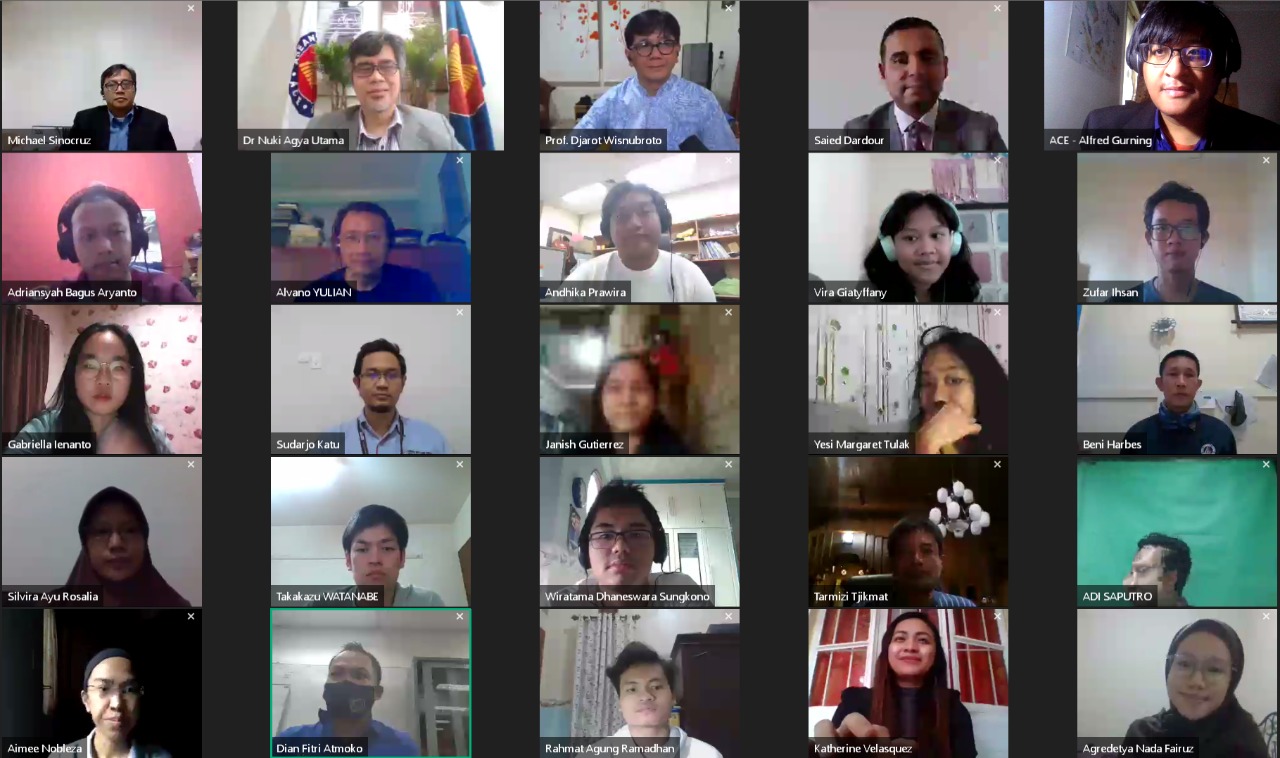Menu
Jakarta, 8 October 2020As an effort to raise public awareness for the Civilian Nuclear Energy (CNE) in Southeast Asia, ASEAN Centre for Energy (ACE) held a webinar which was participated by practitioners, academics, researchers, and public. The webinar was aimed to enhance public knowledge, insight, and awareness of nuclear energy programme. These become very important because the world is currently in the era of energy transition in order to overcome the danger of climate change. Nuclear Energy is expected to have an important role in fighting climate change due to its low carbon and base load characteristic, while also able to meet the increase of energy demand without hurting economic growth.

Participants in Webinar on Practices, Policies, and Plans in Civilian Nuclear Energy in ASEAN
The webinar was moderated by Dr. Nuki Agya Utama, the Executive Director of ACE. After the opening, the event continued with presentations from three distinguished panelists, and followed by a Q&A session, which addressed the future of the development of CNE in ASEAN.
In the opening, Dr. Nuki stated that ASEAN faces a great challenge in implementing clean energy. Policymakers, businesses, and academics need to think critically and creatively to overcome climate-energy problems. Therefore, nuclear energy development is one option to mitigate climate issues resulted by the energy sector.
The first speaker, Mr. Michael Sinocruz, the Chief Planning Division of the Philippines Energy Policy and Planning Bureau, stated the background, legal foundation, and how the Philippines Government’s support to the feasibility of rehabilitating the Bataan Nuclear Power Plant (NPP) in the Philippines. The Bataan NPP was the first NPP in ASEAN region, however the project was mothballed and never connected to the grid. The Philippines implemented the Nuclear Energy Program Implementing Organization (NEPIO) to coordinate efforts by conducting various studies on nuclear energy development in the country. In 2019, the Philippines had a public perception survey on nuclear energy, where the result showed a positive and high acceptance of nuclear energy programme in the country.
In the second part, Prof. Djarot Wisnubroto from Indonesia’s National Atomic Energy Agency (BATAN) explained the history of the Nuclear Energy Program in Indonesia. Currently, BATAN operates three Research Reactors, namely Triga Mark II Bandung, Kartini Yogyakarta, and RSG G.A Siwabessy. The challenges of implementing Nuclear Energy Programme in Indonesia are infrastructure readiness on nuclear power, high financial risk for the first Nuclear Power Plant (NPP), and low prioritisation compared to other energy sources. Indonesia does not yet have an NPP, however it has considered all aspects from back-end to the front-end in every nuclear energy program. A national survey in in 2016 showed a high acceptance of nuclear energy programme in Indonesia. Moreover, in 2019, a local survey showed 87,17% respondents in West Kalimantan supported nuclear power programme.
After that, Dr. Saied Dardour from the International Atomic Energy Agency (IAEA) described about new nuclear power programmes and the financial for nuclear newbuild projects. A new nuclear programme have three phases such as building awareness, building preparatory work for contracting, and managing constructions. In addition, there were three key stakeholders in nuclear energy, namely Government, Regulatory Body, and Owner or Operator.
IAEA Supports the nuclear newcomers using the ‘Milestones Approach’ as a framework for embarking countries in NPP and helping the member states to evaluate the status of nuclear power infrastructures. The nuclear newbuild projects have some challenges such as political risks, complex regulatory processes, and environmental impact. To overcome them, the roles of Governments for ‘de-risking’ nuclear projects should be allocated properly to manage the financial structure.
In summary, the major issues about Nuclear Energy include technology utilization, the challenges of finances to optimize the cost for NPP, and the important role of governments. It was a very insightful session, which could raise our awareness to mitigate climate change seriously by exploring the possibility to develop Nuclear Energy Programmes in ASEAN.(HF)
